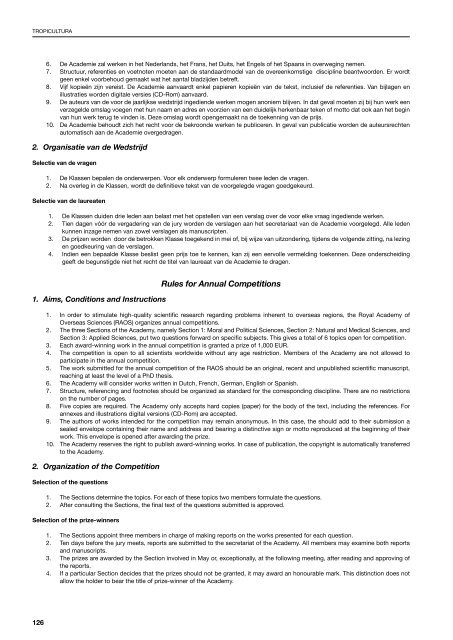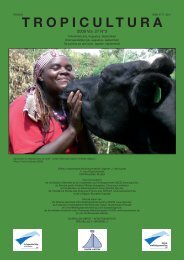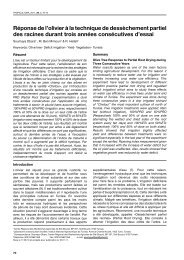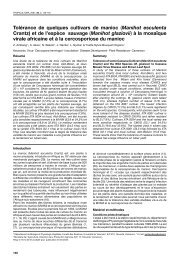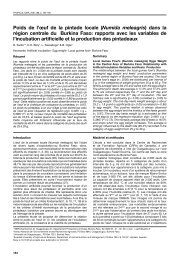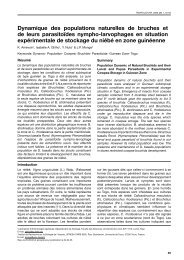Fascicule entier - Tropicultura
Fascicule entier - Tropicultura
Fascicule entier - Tropicultura
Create successful ePaper yourself
Turn your PDF publications into a flip-book with our unique Google optimized e-Paper software.
TROPICULTURA<br />
2.<br />
126<br />
6. De Academie zal werken in het Nederlands, het Frans, het Duits, het Engels of het Spaans in overweging nemen.<br />
7. Structuur, referenties en voetnoten moeten aan de standaardmodel van de overeenkomstige discipline beantwoorden. Er wordt<br />
geen enkel voorbehoud gemaakt wat het aantal bladzijden betreft.<br />
8. Vijf kopieën zijn vereist. De Academie aanvaardt enkel papieren kopieën van de tekst, inclusief de referenties. Van bijlagen en<br />
illustraties worden digitale versies (CD-Rom) aanvaard.<br />
9. De auteurs van de voor de jaarlijkse wedstrijd ingediende werken mogen anoniem blijven. In dat geval moeten zij bij hun werk een<br />
verzegelde omslag voegen met hun naam en adres en voorzien van een duidelijk herkenbaar teken of motto dat ook aan het begin<br />
van hun werk terug te vinden is. Deze omslag wordt opengemaakt na de toekenning van de prijs.<br />
10. De Academie behoudt zich het recht voor de bekroonde werken te publiceren. In geval van publicatie worden de auteursrechten<br />
automatisch aan de Academie overgedragen.<br />
Organisatie van de Wedstrijd<br />
Selectie van de vragen<br />
1.<br />
2.<br />
De Klassen bepalen de onderwerpen. Voor elk onderwerp formuleren twee leden de vragen.<br />
Na overleg in de Klassen, wordt de definitieve tekst van de voorgelegde vragen goedgekeurd.<br />
Selectie van de laureaten<br />
1.<br />
2.<br />
1.<br />
2.<br />
3.<br />
4.<br />
De Klassen duiden drie leden aan belast met het opstellen van een verslag over de voor elke vraag ingediende werken.<br />
Tien dagen vóór de vergadering van de jury worden de verslagen aan het secretariaat van de Academie voorgelegd. Alle leden<br />
kunnen inzage nemen van zowel verslagen als manuscripten.<br />
De prijzen worden door de betrokken Klasse toegekend in mei of, bij wijze van uitzondering, tijdens de volgende zitting, na lezing<br />
en goedkeuring van de verslagen.<br />
Indien een bepaalde Klasse beslist geen prijs toe te kennen, kan zij een eervolle vermelding toekennen. Deze onderscheiding<br />
geeft de begunstigde niet het recht de titel van laureaat van de Academie te dragen.<br />
Aims, Conditions and Instructions<br />
Rules for Annual Competitions<br />
1. In order to stimulate high-quality scientific research regarding problems inherent to overseas regions, the Royal Academy of<br />
Overseas Sciences (RAOS) organizes annual competitions.<br />
2. The three Sections of the Academy, namely Section 1: Moral and Political Sciences, Section 2: Natural and Medical Sciences, and<br />
Section 3: Applied Sciences, put two questions forward on specific subjects. This gives a total of 6 topics open for competition.<br />
3. Each award-winning work in the annual competition is granted a prize of 1,000 EUR.<br />
4. The competition is open to all scientists worldwide without any age restriction. Members of the Academy are not allowed to<br />
participate in the annual competition.<br />
5. The work submitted for the annual competition of the RAOS should be an original, recent and unpublished scientific manuscript,<br />
reaching at least the level of a PhD thesis.<br />
6. The Academy will consider works written in Dutch, French, German, English or Spanish.<br />
7. Structure, referencing and footnotes should be organized as standard for the corresponding discipline. There are no restrictions<br />
on the number of pages.<br />
8. Five copies are required. The Academy only accepts hard copies (paper) for the body of the text, including the references. For<br />
annexes and illustrations digital versions (CD-Rom) are accepted.<br />
9. The authors of works intended for the competition may remain anonymous. In this case, the should add to their submission a<br />
sealed envelope containing their name and address and bearing a distinctive sign or motto reproduced at the beginning of their<br />
work. This envelope is opened after awarding the prize.<br />
10. The Academy reserves the right to publish award-winning works. In case of publication, the copyright is automatically transferred<br />
to the Academy.<br />
Organization of the Competition<br />
Selection of the questions<br />
1.<br />
2.<br />
The Sections determine the topics. For each of these topics two members formulate the questions.<br />
After consulting the Sections, the final text of the questions submitted is approved.<br />
Selection of the prize-winners<br />
1.<br />
2.<br />
3.<br />
4.<br />
The Sections appoint three members in charge of making reports on the works presented for each question.<br />
Ten days before the jury meets, reports are submitted to the secretariat of the Academy. All members may examine both reports<br />
and manuscripts.<br />
The prizes are awarded by the Section involved in May or, exceptionally, at the following meeting, after reading and approving of<br />
the reports.<br />
If a particular Section decides that the prizes should not be granted, it may award an honourable mark. This distinction does not<br />
allow the holder to bear the title of prize-winner of the Academy.


